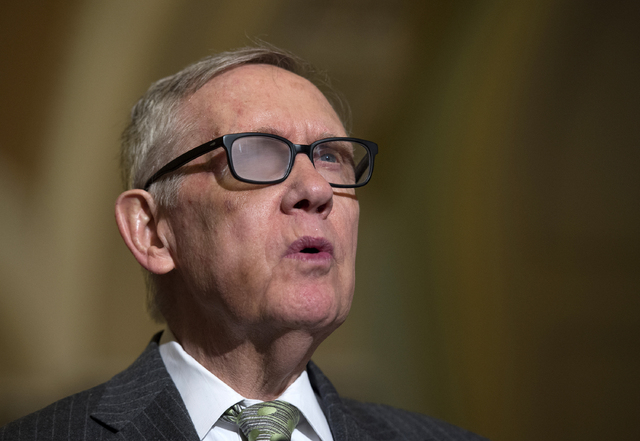WASHINGTON — Senate Democratic Leader Harry Reid, the wily Nevadan who dominated the Senate for a decade from the minority to the majority and back again, announced Friday he will retire after five terms. ADVERTISING WASHINGTON — Senate Democratic Leader
WASHINGTON — Senate Democratic Leader Harry Reid, the wily Nevadan who dominated the Senate for a decade from the minority to the majority and back again, announced Friday he will retire after five terms.
Reid, 75, who shepherded key Obama administration initiatives including the president’s health care law, lost his role as majority leader — the Senate’s top job — when November’s elections swept the Republicans into control. He suffered a personal setback on New Year’s Day, falling while exercising and suffering serious bruises and a lasting injury to his right eye.
Reid was Republicans’ top target in 2016 and widely considered vulnerable to losing the seat he’d held since 1987.
Still, the stubborn gold miner’s son had cheated political death before, and few were writing him off.
In a statement, Reid said the recovery period from his eye injury, which may leave him with permanent vision loss, gave him time to think about his political future.
“We have to make sure that the Democrats take control of the Senate again,” he said. “And I feel it is inappropriate for me to soak up all those resources on me when I could be devoting those resources to the caucus, and that’s what I intend to do.”
Reid, who rose from nothing in the tiny desert town of Searchlight, Nevada, had grown highly unpopular at home due to positions he’d taken on national issues. He turned back a challenge in 2010 and was sure to face an aggressive, big-money attack by Republicans if he ran again.
His departure will set in motion a scramble in the Senate’s Democratic leadership lineup between his top two deputies, Sen. Chuck Schumer of New York and Sen. Dick Durbin of Illinois.
President Barack Obama issued a statement that said Reid “has become not only an ally, but a friend.”
“He never forgot where he came from, and he never stopped working to give everyone who works hard the same shot at success that he had,” Obama said.
As Democratic leader, Reid thrived on behind-the-scenes wrangling. He guided the Senate through a crippling recession and the GOP takeover of the House in the 2010 elections, which sparked years of bitter partisan battles and congressional gridlock.
He was known for frequent gaffes and impolitic remarks, once complaining that tourists to the Capitol smelled, and calling former President George W. Bush a “loser” and a “liar.”
Since returning to work after his fall, Reid has struggled to regain sight in his right eye, appearing in the Capitol in bandages and then with his eye shielded by tinted glasses. He told The Associated Press early this month that the injury was “a tremendous inconvenience,” but nothing more, and not enough to stop him from seeking re-election.
“I’ve had black eyes before,” said Reid, who was an accomplished amateur boxer in his youth.
Even from his post in the minority, Reid leveraged Senate rules to exert steely control. He held his 46-member caucus together against attempts by Republicans to pass legislation undoing Obama’s executive actions on immigration, forcing Senate Majority Leader Mitch McConnell to back down, and House Speaker John Boehner to follow. The episode left some House Republicans complaining bitterly that Reid might as well still be majority leader.
In classic fashion, Reid could not resist needling McConnell, with whom he had an icy relationship, even as he disclosed his departure.
“My friend Sen. McConnell, don’t be too elated. I’m going to be here for 22 months,” Reid said in a video he filmed to announce his retirement.
He also insisted that his decision had nothing to do with his injury or his re-election chances, saying “the path to re-election is much easier than it probably has been anytime that I’ve run for re-election.”
Republicans would surely have disagreed, but the implacable self-confidence was typical of Reid. He survived re-election in 1998 by only 428 votes, and won in 2010 after meddling in the GOP primary to weaken the establishment candidate so that he ended up running against a tea-party backed Republican with some extreme positions.
Reid has built a formidable Democratic machine in Nevada, working to move up the state’s caucuses so that it plays a significant role in the presidential nominating contest, and in the process registering droves of Democratic voters in the swing state.
Yet there is little to no bench of elected Democratic officials to run to replace him. The leading Democrat may be former state attorney general Catherine Cortez Masto. On the Republican side, Gov. Brian Sandoval has been encouraged to run but has said he intends to serve out his full term as governor. Other possibilities are Rep. Joe Heck and former Lt. Gov. Brian Krolicki.
Republicans salivated at the opportunity to pick up Reid’s Senate seat.
“On the verge of losing his own election and after losing the majority, Senator Harry Reid has decided to hang up his rusty spurs,” said Ward Baker, executive director of the National Republican Senatorial Committee. “Not only does Reid instantly become irrelevant and a lame duck, his retirement signals that there is no hope for the Democrats to regain control of the Senate.”



